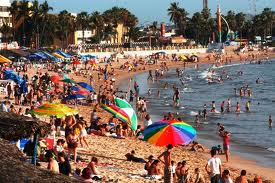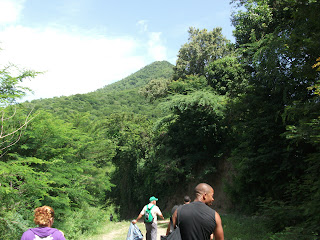My A-Z of the Dominican Republic continues with letter T and Rafael Leonidas Trujillo Molina who was the President of the Dominican Republic for 30 years. As Yuri Gagarin became the first man in space, and we went to the cinema to see ‘101 Dalmatians’ and ‘Breakfast at Tiffany’s’, Trujillo was busy being one of the worst tyrants ever in the history of Latin America, responsible for the deaths of over 50,000 people.
Trujillo was born on 24 October 1891 in San Cristobal, to the west of the capital Santo Domingo, and was the third of eleven children in a working class family. His grandmother was Haitian and later in life he wore pancake make-up to lighten the traces of colour he had inherited from her. As a child he was a petty thief and also liked to collect bottle tops which were called chapitas and so he was known as El Chapita. He hated the name and when he became President he banned the word from the vocabulary.
He had various jobs including a telegraph operator, but when the US invaded the Dominican Republic in 1916 they established a National Guard which he joined. He rose rapidly through the ranks to become a Lieutenant and then a General and in May 1930, using strong arm tactics he won the elections and was declared President.
From the start he used brutal oppression of actual or perceived members of any opposition and his death squad would drive through the streets in a red Packard, known as the death car.
He was obsessed with race and status and in 1937 was told that the Haitians in the border area were taking jobs away from Dominicans, especially in the sugar industry, and were stealing animals and crops. On 2 October 1937, whilst drunk at a party in Dajabon on the border with Haiti he gave orders for the solution to the Haitian problem by saying,
“To the Dominicans who were complaining of the depredations by Haitians living among them, thefts of cattle, provisions, fruits, etc., and were thus prevented from enjoying in peace the products of their labour, I have responded, ‘I will fix this.’ And we have already begun to remedy the situation. Three hundred Haitians are now dead in Bánica. This remedy will continue”
All along the border, Trujillo's men asked anyone with dark skin to identify sprigs of parsley which they held up. Haitians have problems with the ‘r’ in the Spanish word for parsley, "perejil." If they could not pronounce it, they were killed with machetes which the Dominican soldiers used so they could say the carnage was the work of peasants defending themselves. Had they used bullets it would be easily identified as government work as only the government could afford bullets.
The massacre was henceforth known as El Corte, the cutting, alluding to the machetes, or the Parsley Massacre and people living in the far north west of the Dominican Republic at that time remember hundreds of Haitian body parts being washed up on the beaches.
 |
| Jewish refugees in Sosua |
There was condemnation of the Parsley Massacre and to try and improve his international popularity, whilst at the same time continue with his plan to ‘whiten’ the Dominican population, Trujillo offered to take Jewish refugees.
Around 5000 arrived, however many left for the US and the 700 who remained founded the community of Sosua. Unfortunately for Trujillo many were married and of those who were not, very few went on to marry Dominicans, so his ‘whitening’ plan did not succeed.
Known as El Jefe meaning the Boss, he was a total megalomaniac. He changed the name of the capital from Santo Domingo to Cuidad Trujillo; the name of the highest mountain from Pico Duarte to Pico Trujillo. He insisted that churches use the slogan, “Dios en cielo, Trujillo en tierra” which means “God in heaven, Trujillo on earth.” He had an insatiable sexual appetite and people would try and send their daughters away, rather than risk them being taken by Trujillo. Refusal to hand over your daughter resulted in death.
 |
| The Mirabel sisters |
By the late 1950s, opposition to Trujillo's regime was starting to build to a fever pitch. A younger generation of Dominicans began to call for democracy which was met with even greater repression. However, the repression began to lead to international condemnation and the Venezuelan president, Romulo Betancourt was outspoken against him. Trujillo responded by arranging for an assassination attempt, a car bombing which injured but did not kill Betancourt. This incident inflamed world opinion and diplomatic relations were severed by many countries. Trujillo became increasingly paranoid and on Friday November 25 1960 he gave the order to murder the three Mirabel sisters, Patria, Maria Teresa and Minerva. The sisters, known as the Butterflies after Minerva’s underground code name, were outspoken opponents of Trujillo and were beaten to death. Trujillo had now become an embarrassment to the USA, whose Secretary of State had previously said, “He may be a son of a bitch, but he is our son of a bitch.”
On May 30 1961, whilst driving to the home of his mistress in San Cristobal, Trujillo’s car was ambushed and a wounded Trujillo exited the car in order to fire back at his attackers. He was subsequently riddled with bullets, and killed. Some say the Americans were behind the assassination, given he was such an embarrassment; others say it was organized from within the country with no external assistance.
 |
| Trujillo's car after the ambush |
Supporters of Trujillo claim that he reorganized both the country and the economy. He built roads, schools, ports, airports, infrastructure, and paid off all the foreign debt. They say his rule saw more stability and prosperity than most living Dominicans had previously known. And even today, in fact more often as crime increases, he is seen as a guardian of law and discipline, and more and more people are saying, “What we need is another Trujillo”. They speak with fondness about the fact you could leave money lying in the street and no one would take it. There is a growing nostalgia for the social order he imposed.
 |
| Monument at the spot where Trujillo was assassinated |
His opponents claim that civil rights and freedoms in the Trujillo era were virtually nonexistent, and much of the country's wealth wound up in the hands of his family or close associates. It cannot be denied however that this one man had a profound influence on the Dominican Republic.


















































